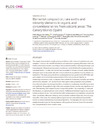Identificador persistente para citar o vincular este elemento:
https://accedacris.ulpgc.es/jspui/handle/10553/114311
| Título: | Elemental composition, rare earths and minority elements in organic and conventional wines from volcanic areas: The Canary Islands (Spain) | Autores/as: | Alonso González, Pablo Parga-Dans, Eva Arribas Blázquez, Paula Pérez Luzardo, Octavio Luis Zumbado Peña, Manuel Luis Hernández González, María Mercedes Rodríguez-Hernández, Ángel Andújar, Carmelo |
Clasificación UNESCO: | 32 Ciencias médicas | Fecha de publicación: | 2021 | Publicación seriada: | PLoS ONE | Resumen: | The organic wine market is rapidly growing worldwide, both in terms of production and consumption. However, the scientific literature is not conclusive regarding differences in the elemental composition of wines according to their production method, including both major and trace elements. Minerals can be present in wine as a result of both anthropogenic and environmental factors. To date, this has not been evaluated in volcanic contexts, neither has the emergent issue of rare earths and other minority elements as potential sources of food contamination. This study using inductively coupled plasma mass spectrometry (ICP-MS) analyses organic and conventional wines produced in the Canary Islands (Spain), an archipelago of volcanic origin, to compare their content of 49 elements, including rare earths and minority elements. Our results showed that organic wines presented lower potential toxic element content on average than their conventional counterparts, but differences were not significant. Geographical origin of the wine samples (island) was the only significant variable differentiating wine samples by their composition profiles. By comparing our data with the literature, no agreement was found in terms of differences between organic and conventionally-produced wines. This confirms that other factors prevail over elemental composition when considering differences between wine production methods. Regarding the toxicological profile of the wines, five samples (three organic and two conventional) exceeded the maximum limits established by international legislation. This highlights the need for stricter analytical monitoring in the Canary Islands, with a particular focus on Cu and Ni concentration, and potentially in other volcanic areas. | URI: | https://accedacris.ulpgc.es/handle/10553/114311 | ISSN: | 1932-6203 | DOI: | 10.1371/journal.pone.0258739 | Fuente: | PLoS ONE [ISSN 1932-6203], v. 16 (11), e0258739, (Noviembre 2021) |
| Colección: | Artículos |
Citas SCOPUSTM
11
actualizado el 08-jun-2025
Citas de WEB OF SCIENCETM
Citations
13
actualizado el 08-feb-2026
Visitas
314
actualizado el 15-ene-2026
Descargas
143
actualizado el 15-ene-2026
Google ScholarTM
Verifica
Altmetric
Comparte
Exporta metadatos
Los elementos en ULPGC accedaCRIS están protegidos por derechos de autor con todos los derechos reservados, a menos que se indique lo contrario.
